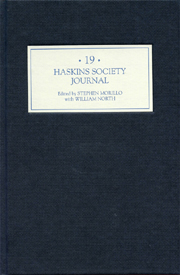Book contents
- Frontmatter
- Contents
- Editor's Note
- Abbreviations
- 1 King Harold's Daughter
- 2 The Anglo-Saxon Chronicles, Identity and the Making of England
- 3 Master Arnulf, Archdeacon of Rouen, Unlicensed Pluralism, and Idoneitas. Defining Eligibility in the Early Thirteenth Century
- 4 The Saint Zenobius Dossal by the Master of the Bigallo and the Cathedral Chapter of Florence
- 5 Discovering the Aquitanian Church in the Corpus of Ademar of Chabannes
- 6 Robert de Londres, Illegitimate Son of William, King of Scots, c.1170–1225
- 7 The Use of Naval Power in the Norman Conquest of Southern Italy and Sicily
- 8 Apology, Protest, and Suppression: Interpreting the Surrender of Caen (1105)
- 9 Henry Loyn and the Context of Anglo-Saxon England
5 - Discovering the Aquitanian Church in the Corpus of Ademar of Chabannes
Published online by Cambridge University Press: 12 September 2012
- Frontmatter
- Contents
- Editor's Note
- Abbreviations
- 1 King Harold's Daughter
- 2 The Anglo-Saxon Chronicles, Identity and the Making of England
- 3 Master Arnulf, Archdeacon of Rouen, Unlicensed Pluralism, and Idoneitas. Defining Eligibility in the Early Thirteenth Century
- 4 The Saint Zenobius Dossal by the Master of the Bigallo and the Cathedral Chapter of Florence
- 5 Discovering the Aquitanian Church in the Corpus of Ademar of Chabannes
- 6 Robert de Londres, Illegitimate Son of William, King of Scots, c.1170–1225
- 7 The Use of Naval Power in the Norman Conquest of Southern Italy and Sicily
- 8 Apology, Protest, and Suppression: Interpreting the Surrender of Caen (1105)
- 9 Henry Loyn and the Context of Anglo-Saxon England
Summary
In the late fall of 1031, Bishop Jordan of Limoges rose to speak before a council of the Peace of God assembled in his city, in order to assert the rights of bishops to supervise monasteries in their dioceses. He did so in the context of a discussion of the proper treatment of men who had been excommunicated for violating Peace decrees; an accusation had been raised that the Limousin monastery of Uzerche had allowed excommunicates who had not been reconciled to their bishops to be buried in holy ground. Quoting scripture as well as patristic and monastic texts, Jordan reminded his audience that the power to bind and loose souls was a particularly episcopal one. In response, the accused abbot of Uzerche proclaimed his innocence by asserting his reverence for episcopal authority, stating: ‘our [monastic] order is only as eminent as it is subject and prompt to obey the bishops. In bishops we honor or deny the Lord, as [Christ] said: “He who hears you, hears me, and he who despises you, despises me [Luke 10:16].”’ Such a discussion of the nature of episcopal authority and the relative roles of bishops and religious houses is extremely rare in Aquitanian sources of the tenth and early eleventh centuries. Information about the de facto uses and limits of episcopal power can be gleaned from charters, but with no surviving vitae of contemporary bishop-saints or treatises on the episcopal office, a general statement on the episcopate and its responsibilities, such as this, is particularly precious.
- Type
- Chapter
- Information
- The Haskins Society Journal 192007 - Studies in Medieval History, pp. 82 - 98Publisher: Boydell & BrewerPrint publication year: 2008



